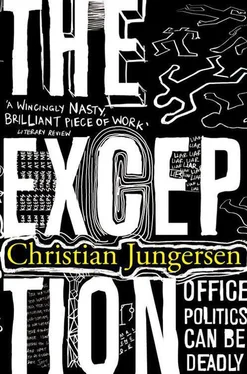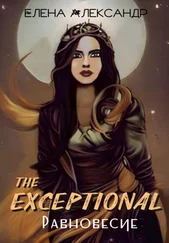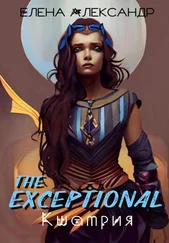Christian Jungersen - The Exception
Здесь есть возможность читать онлайн «Christian Jungersen - The Exception» весь текст электронной книги совершенно бесплатно (целиком полную версию без сокращений). В некоторых случаях можно слушать аудио, скачать через торрент в формате fb2 и присутствует краткое содержание. Год выпуска: 2010, Издательство: Orion Books, Жанр: Современная проза, Триллер, на английском языке. Описание произведения, (предисловие) а так же отзывы посетителей доступны на портале библиотеки ЛибКат.
- Название:The Exception
- Автор:
- Издательство:Orion Books
- Жанр:
- Год:2010
- ISBN:нет данных
- Рейтинг книги:3 / 5. Голосов: 1
-
Избранное:Добавить в избранное
- Отзывы:
-
Ваша оценка:
- 60
- 1
- 2
- 3
- 4
- 5
The Exception: краткое содержание, описание и аннотация
Предлагаем к чтению аннотацию, описание, краткое содержание или предисловие (зависит от того, что написал сам автор книги «The Exception»). Если вы не нашли необходимую информацию о книге — напишите в комментариях, мы постараемся отыскать её.
The Exception — читать онлайн бесплатно полную книгу (весь текст) целиком
Ниже представлен текст книги, разбитый по страницам. Система сохранения места последней прочитанной страницы, позволяет с удобством читать онлайн бесплатно книгу «The Exception», без необходимости каждый раз заново искать на чём Вы остановились. Поставьте закладку, и сможете в любой момент перейти на страницу, на которой закончили чтение.
Интервал:
Закладка:
Camilla understood all that perfectly well, but she still couldn’t grasp why he was being so secretive.
Later, Natasa came back to this question: ‘Perhaps it has something to do with defending your family — or not.’
‘What do you mean?’ Camilla knew instantly that she was about to hear something she’d rather not know.
‘Camilla, there isn’t one of our friends who hasn’t experienced something truly horrific. We don’t talk about it, but we all know.’
‘Yes?’
Natasa took a deep breath. ‘I haven’t spoken about this with Dragan, but everyone in our little group seems to know about it. At one time or another they heard, in confidence from someone else, that Bosnian Muslims raped and then killed Dragan’s three sisters.’
A silence followed. Camilla couldn’t think of what to say. ‘Someone knows that for sure?’
‘Yes. You must remember that everything in Dragan’s life would have been different, if only he had been free to decide. Everything!’
When Camilla came home from work the next day a delicious smell of cooking met her on the landing. Dragan had taken possession of her kitchen after borrowing money from a few friends to buy the ingredients for a casserole and a good bottle of wine.
Neither of them referred to the night before. During the meal, Dragan recited verses in Serbian for her. He explained that they were from a poem written in the 1950s, or maybe the 1960s, by an exiled Serb poet. He had left Yugoslavia because of its communist government and gone to live in London. The poem was very long, and was entitled ‘Lament for Belgrade’. In it, the poet described his travels to the most beautiful capitals of the world. Regardless of whether he was in Paris or Rome or Lisbon, the foreign cities only reminded him of death and emptiness. He longed to leave those places and return to the Belgrade of his youth, the city between the rivers, full of light and a steely will to fight for self-preservation.
Dragan quoted from the English translation of a famous poem:
Belgrade, your blood, like dew, has fallen on the plains again To cool the breath of all those whose quietus nears.
The sun is rising in my dreams. Now shine! Flash! Roar!
Your name, Belgrade, rings out, like lightning from a clear
blue sky.
In bed that night, they impatiently made up for the twenty-four hours that they had been apart.
Afterwards, Dragan lay with his hands behind his head and spoke to her quietly. ‘I’ve escaped. That’s the most important thing. I risked my life to leave. What’s done is done. I must learn to put the past behind me. From now on I’ll live properly, like you do. You’re so good.’
She moved closer to him and kissed his cheek, but he didn’t turn his face towards her. In the dark she watched the reflection of a street light, like a glowing dot, in his pupil. He was lying absolutely still, staring at the ceiling. She kissed him gently once more.
The last time Camilla had spoken on the phone to her parents, her father handed the receiver to her mother much too quickly: a bad sign. Whenever there was a need for white lies, her father usually let his wife handle it. They all knew she was better at pretending than he was.
Camilla had already drawn the conclusion that they wouldn’t like Dragan. Never mind that they had never met him: her parents had disapproved of all her boyfriends. Each time she had taken their dislike to heart. She simply could not escape from wanting to please them.
After she and Dragan had been living together for almost two months, she felt he must meet her parents. They invited Camilla and Dragan for Sunday lunch. Her parents’ flat was in Vanløse and Camilla still hated the place. For the rest of her life she would always drive the long, roundabout routes just to avoid having to pass within sight of her old school. Their home was crammed with every sort of bric-a-brac, which, in a strange way, made it appear vaguely reminiscent of the old Yugoslav immigrants’ flats.
Her parents welcomed them, smiling. Both Camilla’s father and mother did not speak English well, but they tried hard, since Dragan’s Danish was even worse. It went well enough. They showed Dragan into the drawing room first and then led the way to the lunch table. The meal started with toasts of aquavit and explanations about Danish schnapps and its different flavourings.
Camilla knew she had been right all along. Everything was so obviously orchestrated, so perfectly smooth, that there was no way of knowing what they were truly thinking.
During the meal they exchanged the names of various foods in English and Danish and Serbian. Camilla’s parents seemed to be endlessly surprised by how different the words were for the same thing and kept bringing up other dishes to talk about.
She watched them. They avoided eye contact with each other and took care never to leave the room at the same time: they knew she would think that they were criticising Dragan behind her back.
Previously she had told them about the way Yugoslav homes were full of handiwork, so her mother had covered the table with a white-lace tablecloth, a family heirloom made by her great-aunt. Dragan praised the fine lace and told them about the different lace-making techniques that had gone into the tablecloth.
Camilla’s mother remarked that cousin Susanne was also going out with a foreigner. Dragan at once referred to a song by Leonard Cohen about a Suzanne, who ‘takes you down to her place near the river’. In Cohen’s music and lyrics, Dragan had discovered the dark depths he loved in art. He quoted from that song and then from other songs, analysing the music and the tempos and how they related to the words. Camilla smiled at him to show her support. He was trying so hard to demonstrate to his prospective in-laws what a cultured man he was. In Denmark, his education was his one claim to respectability, but Camilla knew only too well that everything he said went right over her parents’ heads. Still, they were trying to make this work, laughing, asking questions.
When Camilla leaned forward and reached across the table for the spiced herring, her mother froze. Something had caught her eye. Camilla knew what it was.
Her mother’s chair shot backwards and fell over as she jumped up and ran out of the dining room. Camilla hurried after her, pulling at her blouse to cover the oblong blue bruise that crept up to her collarbone.
Standing in the kitchen, Camilla’s mother, who also was a little too plump, was short of breath. Camilla stopped a few metres away from her. She wanted to say, ‘Why do you have to be like this, every time?’ or, ‘Why do you always think the worst of every single man in my life?’ But she couldn’t make herself.
Camilla’s mother was in tears. ‘Please, forgive me. I’m sorry, I shouldn’t have run out like that.’
‘Don’t worry, it doesn’t matter,’ Camilla murmured involuntarily.
Her mother hugged her. ‘Oh, Camilla, thank you. We really try, you know. We mean so well … but you have no idea how hard it was for Dad and me when you were with Morten.’
‘But you didn’t know what he was like at the time.’ Camilla backed out of the hug.
Her mother let go. ‘We did notice, you know. We realised what was going on. And we’re so worried that someone would start abusing you again.’
Camilla was furious with her mother and she too was crying. Two months earlier, Camilla would never have dared say anything back. But Dragan had given her the confidence to speak out. ‘You don’t like him. You don’t want me to be happy!’
‘Of course we do! We only want what’s best for you!’
Camilla’s knees gave way and she sat down on the small kitchen bench with its hard, red cushions. It was where she had sat with her glass of juice and marmalade sandwiches every day after school, trying to pull herself together after yet another day of torment.
Читать дальшеИнтервал:
Закладка:
Похожие книги на «The Exception»
Представляем Вашему вниманию похожие книги на «The Exception» списком для выбора. Мы отобрали схожую по названию и смыслу литературу в надежде предоставить читателям больше вариантов отыскать новые, интересные, ещё непрочитанные произведения.
Обсуждение, отзывы о книге «The Exception» и просто собственные мнения читателей. Оставьте ваши комментарии, напишите, что Вы думаете о произведении, его смысле или главных героях. Укажите что конкретно понравилось, а что нет, и почему Вы так считаете.












